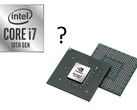Last week, we wrote an editorial calling out the disappointing performance of Intel’s Core i9-9980HK. In almost every 9980HK-equipped laptop we’ve tested, the octa-core CPU hits thermal limitations and performance is subsequently throttled. This in of itself isn’t surprising (we regularly see similar throttling in high-end laptops), but when compared to the cheaper Core i9-9880H used in the MSI GE75 9SG, the (theoretically better) 9980HK fares much worse in multiple passes of Cinebench R15. However, according to one user’s benchmarks, there is an exception.
We should note that in our original article concerning this flip-flop of Intel’s hierarchy, we observed that the Schenker/Clevo Core i9-9980HK we have in our database managed to best the 9880H-equipped MSI GE75 9SG when it was undervolted. Undervolting higher-end laptop CPUs has been shown to greatly improve thermals with little to no detriment to computing performance, which is what we saw with the Schenker/Clevo unit. The laptop could better handle heat output and was thus able to hit higher boost clocks for longer periods over 50 loops of Cinebench R15.
A reader by the name of “littlezipp” posted a comment on that article stating he had managed to hit better performance with the Core i9-9980HK in his Alienware M15 R2. Littlezipp posted his results over on the forum at Notebookreview, and the numbers don’t lie: his machine does indeed trounce the MSI GE75 9SG over a 30-loop benchmark of Cinebench R15, recording an average score of 1842 against the MSI’s average of 1621. This is a 13.6% increase in average performance over the benchmark. However, there’s a bit more to the story.
Littlezipp’s M15 R2 was able to hit these numbers thanks to two key factors: undervolting and repasting. Littlezipp states that he repasted his Alienware with liquid metal, which can greatly improve thermal conductivity. Littlezipp was also able to apply a -125 mV undervolt to the Core i9-9980HK, which is decent. As we’ve seen with the Schenker model in this comparison (and countless other laptops), undervolting can greatly improve performance because it reduces heat output and allows a CPU to boost for longer stretches.
While Littlezipp’s test shows that the higher-priced Core i9-9980HK can outperform its little brother in a laptop, it also provides more evidence that special steps are required for this to occur. While we don’t recommend that everyone with a 9980HK-equipped laptop should immediately apply liquid metal thermal compound and undervolt their CPU, littlezipp’s results show that these two factors can greatly improve performance while reducing temperatures. We haven’t tested the Core i9-9980HK model of the Alienware m15 R2 ourselves to determine its long-term CPU performance, but we will say that the results of the Core i7-9750H model are pretty damning as to its CPU performance with stock thermal compound and factory settings (Alienware m15 R2 i7-9750H on sale now at Amazon). In our review, we observed CPU temperatures hitting 100° C when the silicon was stressed using Prime95.
All said, it still stands to reason that at factory settings and with no other changes, the Core i9-9880H found in the MSI GE75 9SG handily beats the more expensive Core i9-9980HK laptops in extended CPU-dependent workloads. (MSI GE75 i9-9880H on sale now at Amazon)
















